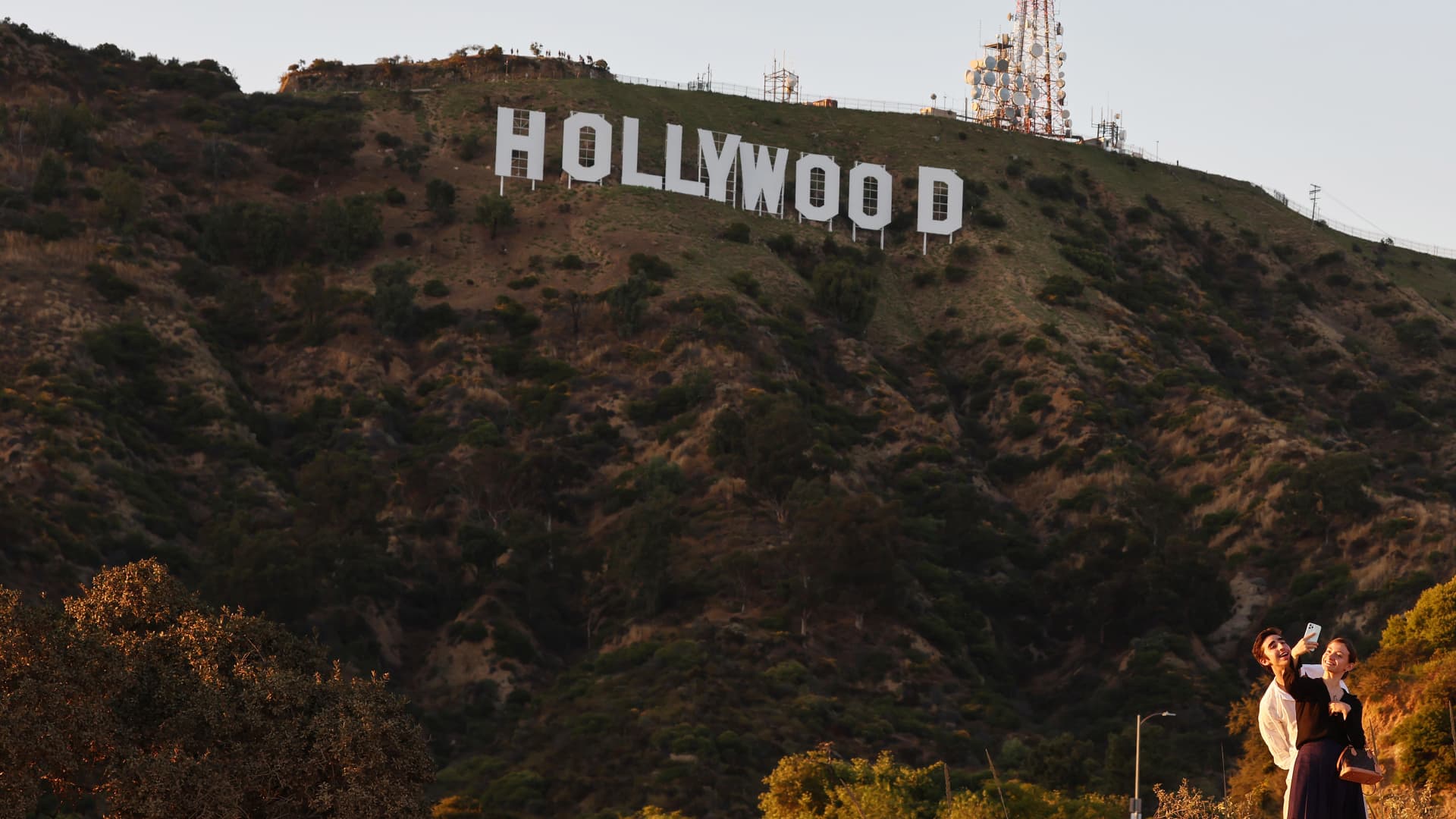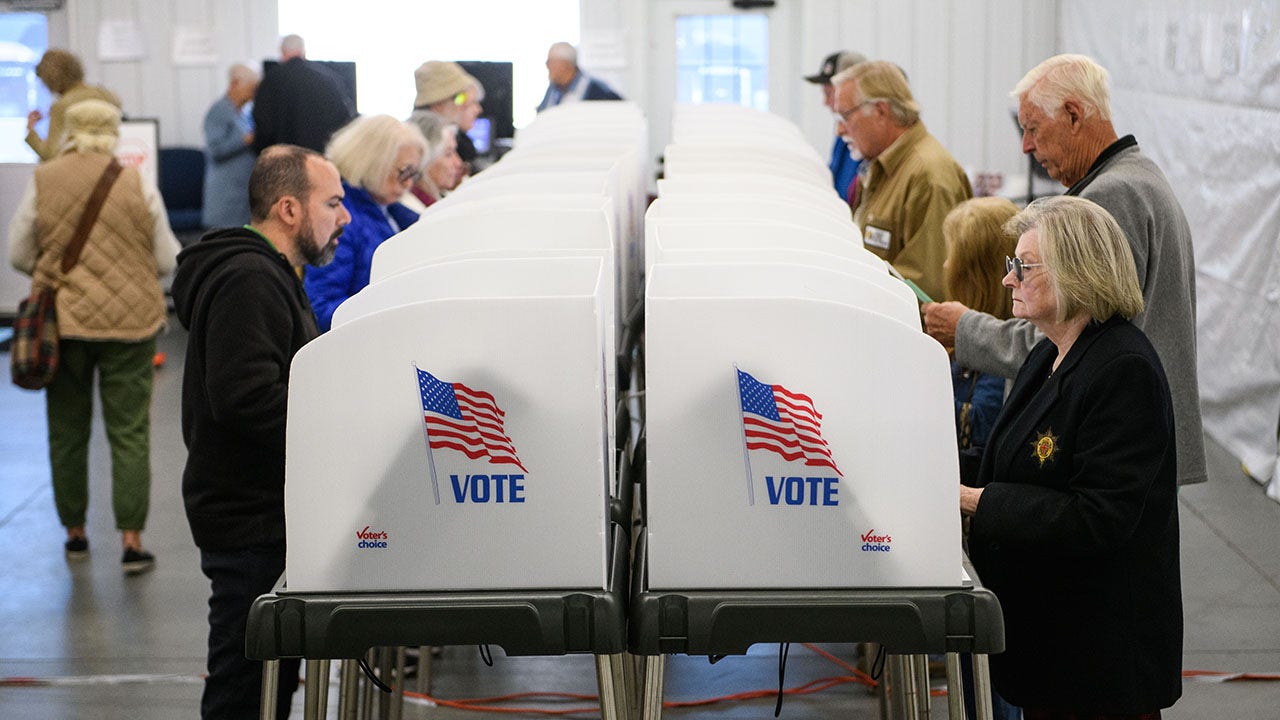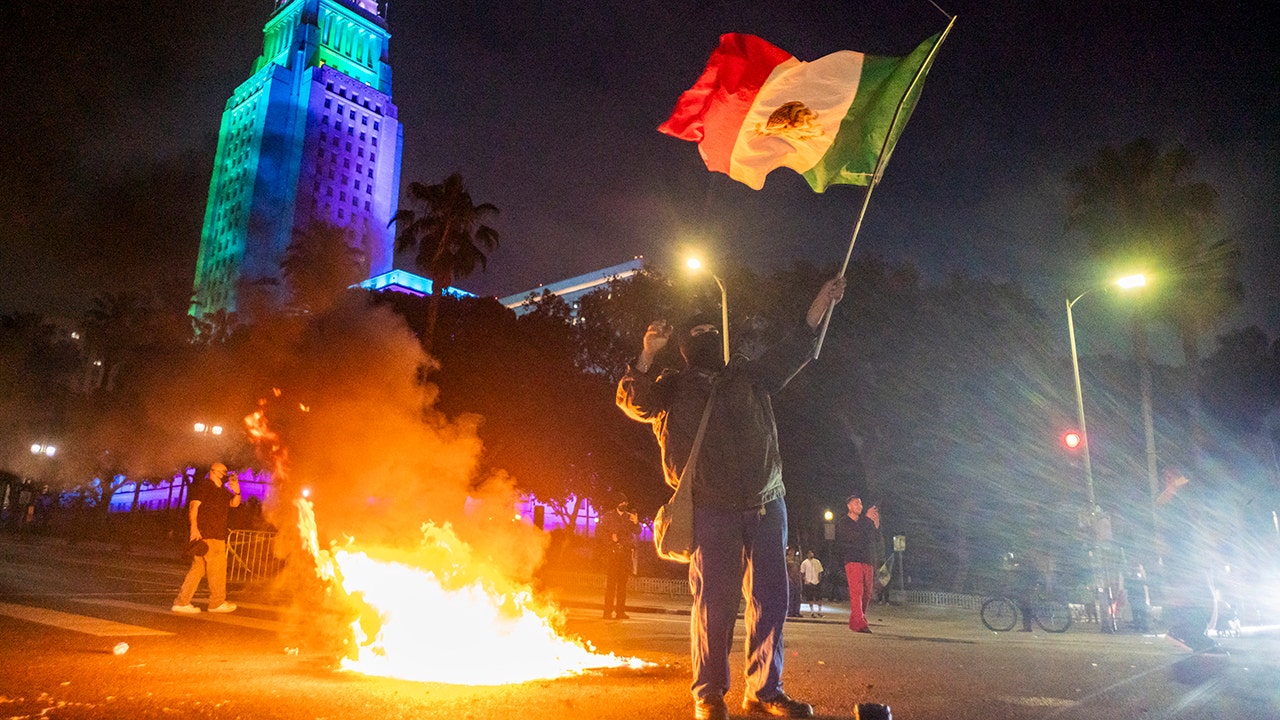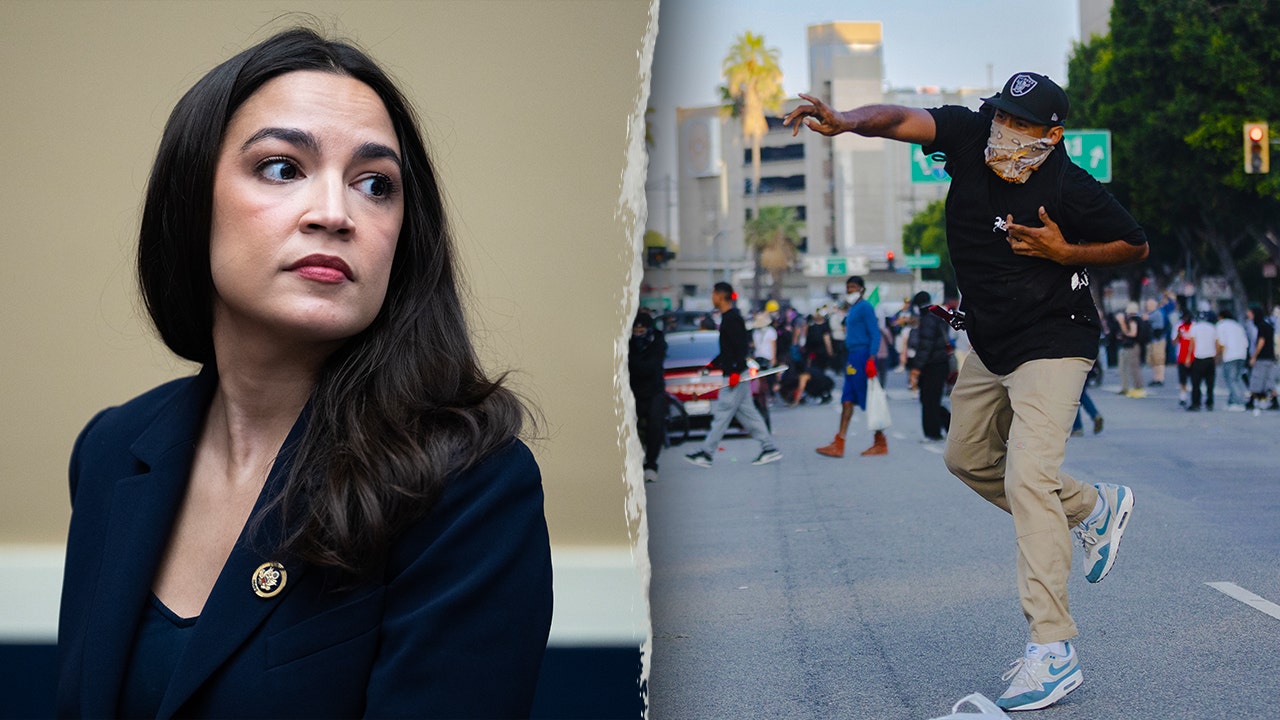California
Hollywood strikes have already had a $3 billion impact on California’s economy, experts say: It’s causing ‘a lot of hardship’

The TV and film writers’ strike has crossed 100 days since the Writers Guild of America and the Alliance of Motion Picture and Television Producers failed to reach an agreement on a new contract, and it’s likely to have cost the California economy at least $3 billion so far.
That’s according to estimates from Todd Holmes, a professor of entertainment industry management at Cal State Northridge, based on economic analysis from the last Writers Guild of America strike that started in 2007. That strike led to 37,700 lost jobs and a $2.1 billion blow to the California economy, according to the Milken Institute, an economic think tank.
Holmes took that $2.1 billion figure and adjusted it for inflation and other factors to come to a new strike-induced loss of upwards of $3 billion for the state of California today.
It’s likely to be even higher now accounting for the additional members of the Screen Actors Guild-American Federation of Television and Radio Artists, the union which represents various performers, joining picket lines in July.
Widespread impacts from restaurants to real estate
The strikes don’t impact just writers or actors.
Halted productions impact all kinds of businesses, including companies that provide catering for productions, restaurants near studios, prop houses, set builders, dry cleaners, professional drivers, florists and more.
“A lot of different people are impacted surrounding the industry,” Holmes says, “and it’s causing them a lot of hardship.”
People who hold entertainment jobs and entertainment-adjacent roles account for almost 20% of the LA-area income, says Lee Ohanian, an economics professor at the University of California, Los Angeles.
“The economic impact is even bigger because average compensation in the industry is considerably higher” than the average earner, he tells CNBC Make It.
That can have a big downstream effect if those workers pull back on their discretionary spending, especially for big purchases like buying a car or a home. In one high-profile instance, actor Billy Porter said in an interview with Evening Standard he is selling his house to save money during the strikes.
A housing crunch could push rent prices higher and cause lower earners to leave the state, said Kevin Klowden, lead author of the Milken report, according to LA Times reporting: “We saw an exodus in the last writers’ strike,” he said.
Across the state, some 700,000 people are employed in entertainment jobs, or close to 5% of the California workforce, Ohanian says.
How long could the strike last
Some experts say the current strike could set the record for the longest writers’ strike in Hollywood history. A 1988 strike lasted 22 weeks, while the strike in 1960 (also the last time writers and actors were both on strike) lasted 21 weeks. Now entering its 15th week, the current strike would surpass both of those records if it goes on until mid-October.
“I could easily see that being broken,” says Ohanian. “Typically, workers have less of an economic cushion than the corporate side, so oftentimes in long strikes the unions tends to cave. But thus far, we’re not seeing that, and this could certainly reach the six-month mark.”
If strikes last until October, Holmes estimates the economic cost will total closer to $4 billion to $5 billion.
“With the dual strikes, if it were to go beyond that into November, that estimate would be closer to $5 billion-plus,” Holmes says.
Why this strike could break records: Union solidarity versus disjointed studios
On Friday, WGA leaders met with negotiators for the Alliance of Motion Picture and Television Producers, which represents Hollywood studios and streamers, for the first time since the strike began May 2. However, the two parties reached a stalemate over two key proposals to establish minimum staffing levels in episodic TV and a guaranteed minimum number of weeks of employment.
The union also confirmed it’s seeking the right to honor other unions’ picket lines, meaning even if WGA gets a deal, writers will still want to honor striking SAG members, and work won’t resume until both strikes are resolved, Variety reports. The WGA represents 11,500 members, while SAG-AFTRA represents roughly 160,000 members.
However, “as united as writers and actors are, it’s more disjointed on the studio side,” Holmes says. That’s because, in addition to traditional studios like Disney and Warner Bros. Discovery, the AMPTP represents tech companies like Amazon and Apple that have changed the landscape with streaming.
For these tech companies, the production and entertainment slice of their business is a much smaller piece of what they do, Holmes says, so it’s going to be easier for them to hold off on negotiating a deal compared with traditional studios where a work stoppage may have a bigger impact on their bottom line.
Politicians could bring strikes’ end: ‘They’re trying to mediate a fight between two of their kids’
Both Holmes and Ohanian are interested to see how politicians respond to the strike, which could determine its end.
For example, in March, LA Mayor Karen Bass publicly stepped in to mediate between school workers of the SEIU Local 99 and the Los Angeles Unified School District, with leaders from both parties praising the mayor for being “a partner” who had been present “incessantly” to broker the agreement, the LA Times reports.
Holmes expects to see more consistent statements from Bass and California Gov. Gavin Newsom about reaching a resolution to end the strikes. Both are likely to lean on messaging about how the strikes are impacting ancillary workers (the caterers and set-builders, for example) who aren’t involved in current negotiations, Ohanian says.
“They could be a quasi representative for all the people affected indirectly in the industry,” he says.
On Friday, Los Angeles mayor Karen Bass called for an “immediate” resolution of the strikes and stated she is “ready to personally engage with all the stakeholders in any way possible to help get this done,” Variety reports. Bass did not take sides in the negotiations but said the resolution must be “fair and equitable,” and that “the economic conditions of the entertainment industry are changing, and we must react and evolve to this challenge.”
One complicating factor will be how Bass and Newsom make their statements with consideration to their donors. While both are invested in support from unions as well as writers and actors, they also receive donor funding from studio heads represented by the AMPTP.
“They’re trying to mediate a fight between two of their kids, and any deviation from purely neutral will be viewed as damaging to the other side,” Ohanian says. “I still think they can help the two sides understand where they’re coming from, but it’s extremely complex.”
Want to be smarter and more successful with your money, work & life? Sign up for our new newsletter!
Get CNBC’s free Warren Buffett Guide to Investing, which distills the billionaire’s No. 1 best piece of advice for regular investors, do’s and don’ts, and three key investing principles into a clear and simple guidebook.
Check out: ‘Survival jobs,’ ex-careers and side hustles: How Hollywood writers are making ends meet 100 days into the strike

California
45,000 Southern California grocery workers authorize strike against Albertsons, Kroger

The union representing more than 45,000 grocery store workers from Santa Barbara to San Diego voted Wednesday, June 11 to authorize a strike against supermarket chains Albertsons and Kroger.
No date has been set for a strike.
Also see: Southern California union leaders say 2025 labor surge is most in decades
The United Food and Commercial Workers labor contract expired March 2, and talks have been on-again, off-again after the chief federal mediator was fired earlier this year as part of Trump administration cuts to the federal government.
The union said 90% of its members voted yes to authorize their bargaining team to call for an Unfair Labor Practice strike, protesting alleged labor violations by Albertson and Kroger during the negotiations. An Unfair Labor Practice refers to actions taken by employers or unions that violate the rights of employees or union members, as defined by labor laws.
Spokespersons with Albertsons Cos., which owns Vons and Pavilions, and Kroger Co., which runs Ralphs, the chain’s largest supermarket unit, were not immediately available for comment.
A separate strike authorization vote is planned with San Bernardino-based Stater Bros. in the coming weeks, UFCW Local 324 President Andrea Zinder said. “Stater has been very difficult at the bargaining table.”
Also see: Stater Bros. lays off store clerks, a first for the 89-year-old chain
Zinder said the union hopes to get Isael Hermosillo, the 13-year veteran mediator with the Federal Mediation and Conciliation Service, back to the negotiation table. She said he has been kept out of the talks by the federal government, even after the labor unions and supermarket chains agreed to pay him a “per diem” for his expertise.
A freeze on his service was recently lifted, so he likely will be available for the next supermarket talks June 25-27, Zinder said.
“The latest information is that he will be able to participate in late June. He wants to do that,” Zinder said.
Two other chains, Encino-based Gelson’s Markets and Super A Foods, a family-owned supermarket chain based in Commerce that caters to Latino and Asian shoppers in the Los Angeles area, each agreed to extend their labor contracts, which also expired in March. They have historically gone along with the labor contracts negotiated by Albertsons, Ralphs and Stater Bros., Zinder explained.
In total, the five supermarket chains employ more than 65,000 food workers, she said.
UFCW did not elaborate on the unfair labor violations.
Seven UFCW local unions from Santa Barbara to San Diego are working on three-year labor contracts with their respective supermarket chains. Details on what the unions want from the grocery chains are pending, but Zinder previously said that food workers are seeking better pay, affordable healthcare benefits, a better pension and more staffing.
“For four months, we’ve negotiated with Kroger and Albertsons, offering solutions to the staff shortage crisis that hurts store operations, working conditions, and customer service,” UFCW said in a statement. “The companies have dismissed our proposals and claimed that our concerns were ‘anecdotal,’ downplaying the real challenges we and our customers face daily.
“At the same time, the companies have broken labor laws by engaging in unlawful surveillance, interrogation of members at actions, threats, and retaliation for union activity. This is unacceptable.”
California
Suisun City’s City Council to vote on annexation of California Forever land

Watch CBS News
Be the first to know
Get browser notifications for breaking news, live events, and exclusive reporting.
California
Daily Briefing: Active-duty troops deployed to California
Good morning!🙋🏼♀️ I’m Nicole Fallert. Can you guess Chipotle’s new dip?
Quick look at Tuesday’s news:
- Anti-ICE protests continued in Los Angeles for a fourth night.
- Health Secretary Robert F. Kennedy Jr. ousted all 17 members of a panel that advises the CDC on the safety, efficacy and clinical needs of vaccines.
- The man at the center of the Supreme Court case that changed gay marriage is worried about equality.
700 Marines are heading to Los Angeles
Anti-immigration raid protests continued last night as the Pentagon is set to send hundreds of Marines to support the National Guard in California as state officials say they will sue the Trump administration’s decision to “trample over” Gov. Gavin Newsom’s authority.
The addition of active-duty troops marks a significant escalation. It comes as California officials say they will sue the Trump administration after the president ordered National Guardsmen to Los Angeles without the governor’s consent and after the president even suggested Newsom should be arrested.
Get more coverage on the situation in Los Angeles with USA TODAY:
New Jersey governor’s race will signal Democrats next move
New Jersey’s gubernatorial primary Tuesday is considered one of the best litmus tests for the type of candidate Democrats have an appetite for going forward. There are six Democrats seeking to succeed Gov. Phil Murphy (a fellow Democrat who is term limited). Electability remains an issue in the primary that could hobble progressives with a more aggressive approach, and give more centrist-minded contenders an opening. And many New Jersey Democrats have openly expressed concern in recent reports that their state, which tends to lean blue in presidential elections, might be turning red. Experts have warned how close — and unpredictable — this race will be.
More news to know now
What’s the weather today? Check your local forecast here.
RFK Jr. fires entire CDC vaccine advisory panel
Health Secretary Robert F. Kennedy Jr. has fired all 17 members of a committee that advises the federal government on vaccine safety and will replace them with new members, a move that the Trump administration’s critics warned would create public distrust around the government’s role in promoting public health. Kennedy Jr.’s decision marks a reversal from what a key Republican senator said the Trump Cabinet member had promised during his confirmation hearings earlier this year. One medical expert told USA TODAY that Kennedy was “fixing a problem that doesn’t exist.”
Travelers caught off guard as travel ban rules come into effect
‘It’s scary. It makes me worried. It affects my decisions to go home to visit my family.’
~ Randy Wicaksana, 33, an Indonesian national who has lived in the U.S. for about three years. Wicaksana said he is preparing to return home later this month to renew his visa but is increasingly uncertain about what might await him when he comes to the U.S. again.
Today’s talkers
He was at the center of a Supreme Court case that changed gay marriage. Now, he’s worried.
When Jim Obergefell was sitting in the gallery at the Supreme Court on June 26, 2015, he was waiting to hear his name. The justices were preparing to rule on Obergefell v. Hodges, a case that became a landmark in the progress toward LGBTQ+ rights in the U.S. The case, which considered the rights of same-sex couples to marry, ultimately won favor with a majority of the justices, but for Obergefell, the moment wasn’t, and could never be, totally complete. His husband, John Arthur, died years before the ruling was announced. Now, 10 years on, Obergefell sat down with USA TODAY to reflect on how their love for each other helped shape the fight for marriage equality in the U.S., and what progress there is to still be made in the fight for equality.
Photo of the day: Ed soars
If you’ve missed Ed the zebra’s escapades this past week, the rogue zoo animal was finally caught and given an aerial trip home. He just wanted to see the world from a different point of view!
Nicole Fallert is a newsletter writer at USA TODAY, sign up for the email here. Want to send Nicole a note? Shoot her an email at NFallert@usatoday.com.
-

 West5 days ago
West5 days agoBattle over Space Command HQ location heats up as lawmakers press new Air Force secretary
-

 Alaska1 week ago
Alaska1 week agoInterior Plans to Rescind Drilling Ban in Alaska’s National Petroleum Reserve
-

 Technology1 week ago
Technology1 week agoMicrosoft will finally stop bugging Windows users about Edge — but only in Europe
-

 Politics1 week ago
Politics1 week agoRed state tops annual Heritage Foundation scorecard for strongest election integrity: 'Hard to cheat'
-

 World1 week ago
World1 week agoTwo suspected Ugandan rebels killed in Kampala explosion
-

 Politics1 week ago
Politics1 week agoTrump pushes 'Big, Beautiful Bill' as solution to four years of Biden failures: 'Largest tax cut, EVER'
-

 Culture1 week ago
Culture1 week agoDo You Know the Jobs These Authors Had Before They Found Literary Success?
-

 World1 week ago
World1 week agoEU trade chief to meet US counterpart in Paris amid tariff tensions
















